Zero fillers. Fast acting. What’s not to like?
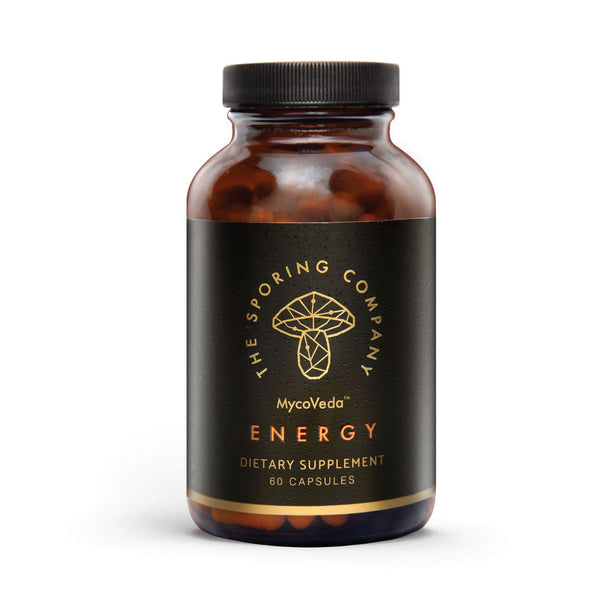
MycoVeda™ Energy
$49.95
Zero fillers. Fast acting. What’s not to like?

$49.95

$39.95

$84.95 $89.90

$49.95
Zero fillers
100% organic
Gluten-free
Vegan-friendly
Non-GMO
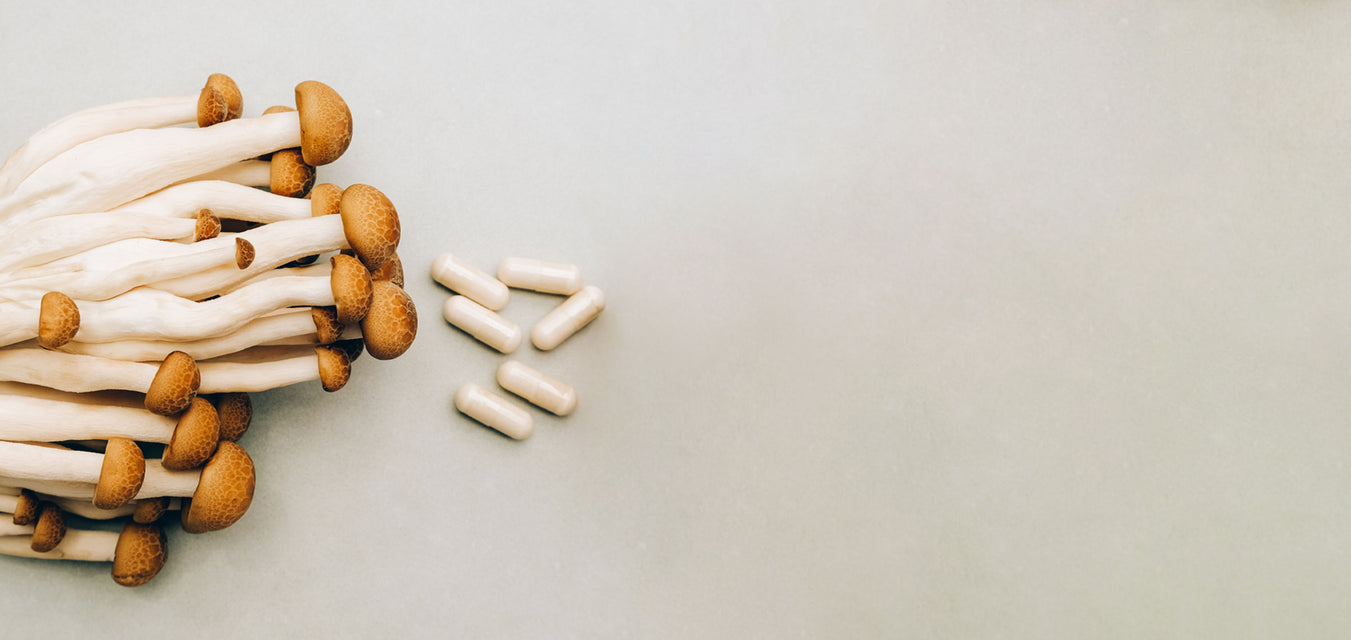
Worldwide, researchers are discovering more and more about both mushrooms and ayurveda. TL/DR: it’s extraordinary stuff.
The science behind Sporing
The Sporing Company is committed to spreading the power of mushrooms to everyone, everywhere. And to make the world 10% kinder. Or 12% — we’re not picky.
See the visionOur blog articles explore various facets of the mushroom and ayurveda experience.
Learn about the history, benefits, ingredients, latest scientific advancements and more.
November 14, 2023
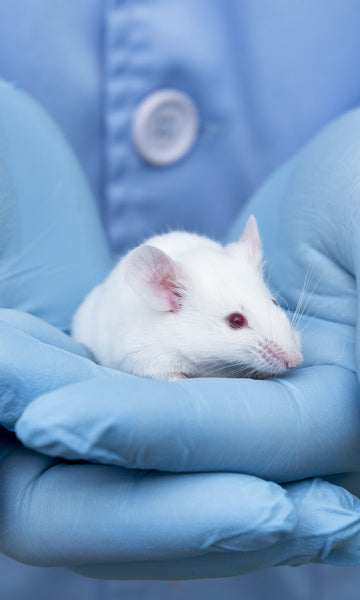
The quest for effective and safe sleep aids has led researchers to explore traditional remedies that hold the potential to address sleep-related challenges. Among these, Ganoderma lucidum, also known as Ling Zhi or Reishi mushroom, has garnered attention for its historical use as a tranquilizing agent. A study titled "Extract of Ganoderma lucidum prolongs sleep time in rats" delves into the sleep-promoting effects of Ganoderma lucidum extract (GLE) and offers a glimpse into the potential mechanisms behind its hypnotic properties. This article delves into the study's objectives, methodology, key findings, and the broader implications of these discoveries in the realm of natural sleep enhancement. Ganoderma lucidum: An Ancient Tranquilizer for Modern Sleep Woes: Ganoderma lucidum, a basidiomycete white-rot macrofungus, has been utilized for centuries in traditional Chinese medicine to alleviate restlessness, insomnia, and palpitations. Known as "Ling Zhi," this mushroom has earned a reputation for its "An-Shen" effect, denoting its tranquilizing qualities. The study aims to uncover whether Ganoderma lucidum extract (GLE) can indeed influence sleep patterns in freely moving rats and elucidate the potential mechanisms underlying this effect. Methodology: A Pathway to Understanding: The researchers obtained Ganoderma lucidum extract from the fruiting bodies of the mushroom. Rats were subjected to three days of oral GLE treatment, after which electroencephalographic (EEG) and electromyographic (EMG) recordings were conducted over a span of six hours during the rats' active period (9:00 p.m. to 3:00 a.m.). These recordings provided insights into sleep parameters. The researchers also assessed the levels of tumor necrosis factor-α (TNF-α), a cytokine associated with sleep regulation. Delving into Sleep Effects: The administration of GLE over a span of three days yielded intriguing results. At a dosage of 80 mg/kg (i.g.), GLE significantly extended total sleep time and non-rapid eye movement (NREM) sleep time in freely moving rats. Remarkably, this effect was achieved without influencing slow-wave sleep (SWS) or rapid eye movement (REM) sleep. These findings alluded to GLE's potential as a sleep-enhancing agent, warranting further exploration into its mechanisms of action. Unraveling Mechanisms: The Role of TNF-α: The study investigated the potential involvement of cytokines, specifically TNF-α, in GLE's sleep-enhancing effects. Corresponding with the increase in sleep time, the levels of TNF-α exhibited a concurrent rise in serum, hypothalamus, and dorsal raphe nucleus. To delve deeper, the researchers introduced an intracerebroventricular injection of TNF-α antibody, leading to the significant inhibition of GLE's hypnotic effect. Additionally, co-administration of GLE and TNF-α at ineffective doses exhibited an additive hypnotic effect. Conclusions and Ethnomedical Validation: The study titled "Extract of Ganoderma lucidum prolongs sleep time in rats" sheds light on GLE's potential to promote sleep in rats. While the exact mechanisms remain elusive, the findings suggest a connection between GLE and the modulation of cytokines, particularly TNF-α. These insights lend support to the historical use of Ganoderma lucidum in traditional medicine as a sleep aid. Broader Implications: Natural Remedies for Sleep Enhancement: The investigation into Ganoderma lucidum's sleep-enhancing effects underscores the allure of natural interventions in addressing sleep disturbances. With its ethnomedical legacy substantiated by modern research, Ling Zhi emerges as a potential solution for those seeking restful slumber. As the study reveals tantalizing glimpses into the intricate web of cytokine modulation and sleep enhancement, it beckons further research into the untapped potential of traditional remedies. Read more here: https://www.sciencedirect.com/science/article/abs/pii/S0378874111008981 References: Cui, X., Cui, S., Zhang, J., Wang, Z., Yu, B., Sheng, Z., Zhang, X., & Zhang, Y. (2012). Extract of Ganoderma lucidum prolongs sleep time in rats. Journal of Ethnopharmacology, 139(3), 796–800. https://doi.org/10.1016/j.jep.2011.12.020 Lin ZB. Cellular and molecular mechanisms of immuno-modulation by Ganoderma lucidum. J Pharmacol Sci. 2005;99(2):144-153. Chu QP, Wang LE, Cui XY, et al. Extract of Ganoderma lucidum potentiates pentobarbital-induced sleep via a GABAergic mechanism. Pharmacol Biochem Behav. 2007;86(4):693-698. Gao Y, Zhou S, Jiang W, Huang M, Dai X. Effects of ganopoly (a Ganoderma lucidum polysaccharide extract) on the immune functions in advanced-stage cancer patients. Immunol Invest. 2003;32(3):201-215. Opp MR. Cytokines and sleep. Sleep Med Rev. 2005;9(5):355-364. Lin ZB. Cellular and molecular mechanisms of immuno-modulation by Ganoderma lucidum. J Pharmacol Sci. 2005;99(2):144-153. Opp MR. Sleep and psychoneuroimmunology. Neurologic Clinics. 2006;24(3):493-514.
November 14, 2023

Sleep, a fundamental physiological process, plays a pivotal role in maintaining overall health and well-being. The search for safe and effective interventions to address sleep-related disorders has led researchers to explore traditional herbal remedies. One such notable exploration delved into the sleep-inducing potential of Ganoderma lucidum, commonly known as Reishi mushroom. The study titled "Extract of Ganoderma lucidum potentiates pentobarbital-induced sleep via a GABAergic mechanism" offers intriguing insights into the mechanisms underlying Reishi's sleep-related effects. This article delves into the study's methodology, findings, implications, and the broader context of natural interventions for sleep improvement. Ganoderma lucidum: Bridging Ancient Wisdom with Modern Research: Ganoderma lucidum, revered for centuries in traditional medicine, has gained recognition for its diverse therapeutic properties. Known by names like Reishi mushroom, it has been utilized in treating conditions ranging from diabetes to cancer. One notable aspect of Reishi's traditional use is its potential to alleviate insomnia and promote restful sleep. The study under scrutiny aimed to unravel the mechanisms by which Ganoderma lucidum aqueous extract (GLE) exerts its effects on sleep, shedding light on the herb's sedative properties. Methodology: A Pathway to Insightful Findings: The study employed a multifaceted approach to assess GLE's impact on sleep architecture and sedative activity. The aqueous extract of Ganoderma lucidum was obtained through a meticulous extraction process, yielding a product rich in polysaccharides—a key component thought to contribute to its therapeutic effects. Exploring Sleep Parameters: A Window into GLE's Effects: The researchers evaluated GLE's effects on sleep by examining parameters such as sleep latency, duration of sleep, and various sleep stages. The results in normal rats showed no significant changes in sleep architecture at doses of 80 and 120 mg/kg. However, GLE exhibited noteworthy effects in pentobarbital-treated rats. It reduced sleep latency, prolonged sleeping time, and increased non-REM sleep duration and light sleep time. These findings hinted at GLE's potential to modulate sleep-inducing pathways, thereby suggesting its utility as a sleep aid. Insights into Mechanism: A GABAergic Connection: To unravel the mechanism driving GLE's sleep-related effects, the study investigated its interaction with the GABAergic system—a crucial neurotransmitter pathway known for its role in promoting relaxation and sleep. Flumazenil, a benzodiazepine receptor antagonist, was employed to discern GLE's effects on this system. The results were intriguing: Flumazenil significantly antagonized GLE's impact on sleep latency, sleeping time, non-REM sleep duration, and light sleep duration in pentobarbital-treated rats. This observation hinted at a GABAergic involvement in GLE's sleep-inducing properties, suggesting a potential mechanism of action akin to anti-anxiety medications without the associated side effects and dependence. Delta Waves and Beyond: The Deeper Aspects of Sleep Enhancement: Further analysis of the study's findings unveiled the impact of GLE on delta activity during non-REM sleep. Notably, flumazenil failed to block GLE's effect on delta activity. Delta waves, associated with deep sleep and restorative processes, play a vital role in promoting overall sleep quality. The preservation of this effect even in the presence of flumazenil suggests a multifaceted mechanism that extends beyond GABAergic pathways. Promising Implications for Sleep Improvement: The study titled "Extract of Ganoderma lucidum potentiates pentobarbital-induced sleep via a GABAergic mechanism" underscores the potential of Ganoderma lucidum as a natural sleep aid. By significantly impacting sleep latency, duration, non-REM sleep, and light sleep, GLE showcases its potential to address sleep-related challenges. The study's focus on the GABAergic pathway illuminates a novel mechanism through which Reishi's effects unfold, aligning with established anti-anxiety pathways without the drawbacks associated with traditional medications. Broader Context: Natural Remedies for Sleep Enhancement: The investigation into Ganoderma lucidum's sleep-inducing effects exemplifies the growing interest in natural remedies to address sleep-related disorders. Traditional wisdom, backed by contemporary scientific rigor, offers a wealth of potential interventions that align with the body's natural mechanisms. As the quest for safe and effective sleep aids continues, botanical treasures like Reishi mushroom offer a promising avenue for holistic well-being. Read more here: https://www.sciencedirect.com/science/article/pii/S009130570700086X?via%3Dihub References: Chu, Q., Wang, L., Cui, X., Fu, H., Lin, Z., Lin, S., & Zhang, Y. (2007). Extract of Ganoderma lucidum potentiates pentobarbital-induced sleep via a GABAergic mechanism. Pharmacology, Biochemistry and Behavior, 86(4), 693–698. https://doi.org/10.1016/j.pbb.2007.02.015 Singh BN, Sharma RA. Plant terpenes: defense responses, phylogenetic analysis, regulation and clinical applications. Springer Science & Business Media; 2013. Jong SC, Birmingham JM. Medicinal benefits of the mushroom Ganoderma. Adv Appl Microbiol. 1992;37:101-134. Tang W, Gao Y, Chen G, et al. A randomized, double-blind and placebo-controlled study of a Ganoderma lucidum polysaccharide extract in neurasthenia. J Med Food. 2005;8(1):53-58. Wachtel-Galor S, Yuen J, Buswell JA, Benzie IFF. Ganoderma lucidum (Lingzhi or Reishi): A Medicinal Mushroom. In: Herbal Medicine: Biomolecular and Clinical Aspects. 2nd edition. CRC Press/Taylor & Francis; 2011. Chapter 9.
November 14, 2023
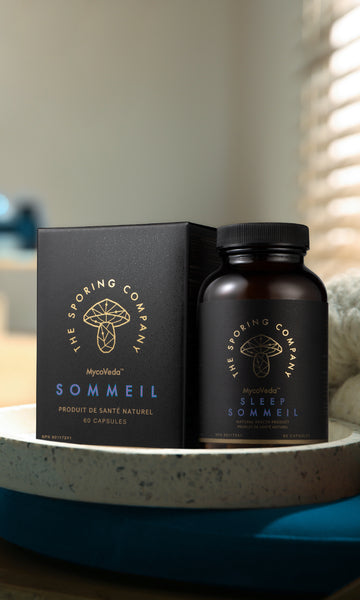
In today's fast-paced world, where productivity often takes precedence over rest, the value of a good night's sleep is frequently underestimated. But beneath the veil of nighttime slumber lies a complex and vital process that profoundly impacts our health and well-being. This article delves into the science of sleep, exploring its various stages, the dire consequences of sleep deprivation, and the potential benefits of natural nutraceuticals, such as MycoVeda Sleep, in enhancing sleep quality. The Basics of Sleep Sleep, a naturally recurring state of reduced consciousness, is an essential physiological function that remains critical to our survival. While the precise mechanisms governing sleep are not entirely understood, decades of scientific research have unveiled many of its intricacies. The Sleep-Wake Cycle Our sleep-wake cycle is regulated by an internal clock known as the circadian rhythm, which is influenced by external cues such as light and temperature. This internal clock orchestrates our body's transition between wakefulness and sleep. Sleep Architecture Sleep is not a uniform state but rather comprises distinct stages that cycle throughout the night. The two primary categories of sleep are Rapid Eye Movement (REM) and Non-Rapid Eye Movement (NREM) sleep. NREM sleep is further divided into three stages: N1, N2, and N3. N1 (NREM Stage 1): This is the transition stage between wakefulness and sleep, lasting only a few minutes. Muscle activity decreases, and eye movements slow. N2 (NREM Stage 2): This is the first true stage of sleep, characterized by further reduction in muscle activity and a decrease in conscious awareness of the external environment. N3 (NREM Stage 3): Also known as deep sleep or slow-wave sleep (SWS), this stage is crucial for physical restoration and repair. Blood pressure drops, and the body undergoes processes that aid in recovery. REM Sleep: During REM sleep, our brains become highly active, similar to when we are awake. This is the stage associated with vivid dreaming. Additionally, REM sleep is important for cognitive functions like memory consolidation. The sleep cycle progresses through these stages in a roughly 90-minute pattern, with N3 or deep sleep occurring most prominently during the first half of the night and REM sleep becoming more prevalent in the latter part. Why Sleep Matters Physical Restoration Sleep is a period of physical restoration when the body undergoes crucial processes like tissue repair, muscle growth, and immune system support. Deep sleep, in particular, plays a significant role in these reparative functions. Cognitive Functions Sleep is closely tied to cognitive functions, including memory consolidation, problem-solving, and creative thinking. Quality sleep helps us process information acquired during the day and enhances our ability to learn. Emotional Well-Being A good night's sleep contributes to emotional well-being by regulating mood and stress. Sleep deprivation can lead to heightened emotional responses and reduced ability to cope with stress. Hormonal Balance Sleep is intricately connected to hormonal balance. The hormones that regulate appetite, metabolism, and stress are influenced by the quantity and quality of sleep. Disruptions in sleep patterns can lead to weight gain and hormonal imbalances. The Consequences of Sleep Deprivation Sleep deprivation is a pervasive issue in modern society, often underestimated in its seriousness. Chronic sleep deprivation has a multitude of adverse effects on our physical and mental health: Impaired Cognitive Function: Sleep-deprived individuals often experience impaired memory, reduced attention span, and decreased decision-making abilities. Mood Disorders: Sleep deficiency can contribute to mood disorders such as depression and anxiety. Increased Risk of Chronic Diseases: Long-term sleep deprivation is associated with an increased risk of heart disease, diabetes, obesity, and other chronic health conditions. Weakened Immune System: A lack of sleep compromises the immune system's ability to fend off infections, making us more susceptible to illnesses. Weight Gain: Sleep deprivation disrupts the balance of hunger-regulating hormones, leading to increased appetite and a higher risk of obesity. Reduced Life Expectancy: Chronic sleep deprivation has been linked to a decreased life expectancy, highlighting its severe consequences. Enter Natural Nutraceuticals: The MycoVeda Sleep Solution In the quest for better sleep, many individuals turn to natural remedies, including nutraceuticals that combine the wisdom of traditional herbal medicine with modern scientific understanding. MycoVeda Sleep, one such product, blends the power of functional mushrooms and time-tested Ayurvedic herbs to offer a natural approach to improving sleep quality. Let's explore the key ingredients: Reishi (Ganoderma lucidum): Reishi is a mushroom known for its adaptogenic properties and immune system support. Its potential to reduce anxiety and promote relaxation makes it a valuable addition to sleep-enhancing formulations. Scientific studies have linked Reishi to improved sleep quality and reduced insomnia, further validating its sleep-supporting benefits. Skullcap (Scutellaria lateriflora): Skullcap is an herb with a long history of use in traditional medicine, particularly for its potential to alleviate anxiety and nervousness. By calming the mind and reducing stress, Skullcap may contribute to a more peaceful transition into sleep. Valerian Root (Valeriana officinalis): Valerian root is a well-known herbal remedy for insomnia and sleep disturbances. Research suggests that it may enhance sleep quality and reduce the time it takes to fall asleep. Valerian root is believed to work by increasing the activity of gamma-aminobutyric acid (GABA), a neurotransmitter that promotes relaxation. The Science Behind MycoVeda Sleep The effectiveness of MycoVeda Sleep lies in the science behind its natural ingredients. Let's explore how these components work: Reishi (Ganoderma lucidum): Reishi contains bioactive compounds, including triterpenoids and polysaccharides, that have been linked to its sleep-improving effects. These compounds may modulate neurotransmitters like GABA, promoting relaxation and reducing anxiety. Additionally, Reishi has anti-inflammatory properties that can help soothe the body and mind for a more restful sleep experience. Skullcap (Scutellaria lateriflora): Skullcap contains flavonoids and other compounds that may reduce anxiety and promote a calm mental state. By lowering stress levels, Skullcap contributes to a more peaceful and restful sleep. Valerian Root (Valeriana officinalis): Valerian root's sleep-enhancing properties are attributed to its ability to increase GABA activity in the brain. This promotes relaxation and helps reduce the time it takes to fall asleep, ultimately leading to improved sleep quality. Conclusion: Embracing the Science of Sleep Understanding the science of sleep is the first step in realizing its profound impact on our health and well-being. Quality sleep is not a luxury but a necessity for a healthy, productive life. While sleep deprivation can have dire consequences, the wisdom of natural nutraceuticals like MycoVeda Sleep offers a promising path to better sleep quality. By incorporating the power of functional mushrooms and Ayurvedic herbs, MycoVeda Sleep harnesses the potential of nature to support our quest for restorative sleep. Scientific research supports the use of these ingredients, further enhancing their credibility as natural sleep aids. It's crucial to prioritize sleep as an integral component of our daily routines. By doing so, we can unlock the myriad benefits that quality sleep offers. Improved cognitive function, emotional well-being, hormonal balance, and a strengthened immune system are just a few of the rewards that accompany a good night's sleep. As we navigate the challenges of our fast-paced lives, embracing the science of sleep becomes paramount. The ancient wisdom of herbs and the insights of modern science converge in products like MycoVeda Sleep, offering a holistic approach to sleep enhancement. By understanding the science behind sleep and exploring natural nutraceutical solutions, we can take a significant step toward achieving the restful, rejuvenating sleep we all deserve. In closing, remember that sleep is not merely a passive state of rest; it's an active and dynamic process essential for our well-being. Embrace the science of sleep, and let the natural ingredients in products like MycoVeda Sleep be your allies in the quest for a healthier, more revitalized you. Prioritize sleep, and you'll be amazed at the positive transformations it can bring to your life. Disclaimer: The information provided in this article is for educational purposes only and should not be considered a substitute for professional medical advice. Please consult a healthcare expert or physician before starting any new sleep regimen or using natural supplements like MycoVeda Sleep, especially if you have underlying medical conditions or are taking medication. --- References: Dement, W. C., & Vaughan, C. (1999). The Promise of Sleep: A Pioneer in Sleep Medicine Explores the Vital Connection Between Health, Happiness, and a Good Night's Sleep. Dell. Medic, G., Wille, M., & Hemels, M. E. (2017). Short- and long-term health consequences of sleep disruption. Nature and Science of Sleep, 9, 151–161. Riemann, D., Spiegelhalder, K., Feige, B., Voderholzer, U., Berger, M., & Perlis, M. (2010). The hyperarousal model of insomnia: a review of the concept and its evidence. Sleep Medicine Reviews, 14(1), 19–31. Gao, Y., Zhou, S., & Chen, G. (2002). A Phase I/II Study of a Ganoderma lucidum (Leyss. ex Fr.) Karst. (Ling Zhi, Reishi Mushroom) Extract in Patients with Type II Diabetes Mellitus. Advances in Therapy, 19(6), 261–270. Taavoni, S., Ekbatani, N., Kashaniyan, M., & Haghani, H. (2013). Effect of valerian on sleep quality in postmenopausal women: a randomized placebo-controlled clinical trial. Menopause, 20(10), 1160–1165. National Sleep Foundation. (2021). Sleep Architecture. [https://www.sleepfoundation.org/how-sleep-works/sleep-science/sleep-stages](https://www.sleepfoundation.org/how-sleep-works/sleep-science/sleep-stages) Johns Hopkins Medicine. (2021). The Science of Sleep. [https://www.hopkinsmedicine.org/health/wellness-and-prevention/the-science-of-sleep](https://www.hopkinsmedicine.org/health/wellness-and-prevention/the-science-of-sleep) National Institute of Neurological Disorders and Stroke. (2019). Brain Basics: Understanding Sleep. [https://www.ninds.nih.gov/Disorders/Patient-Caregiver-Education/understanding-Sleep](https://www.ninds.nih.gov/Disorders/Patient-Caregiver-Education/understanding-Sleep)
November 14, 2023

Reishi mushroom (Ganoderma lucidum), revered for centuries in traditional Eastern medicine, has emerged as a fascinating subject of modern scientific research. With its multifaceted benefits, Reishi has earned the title of "The King of Adaptogens." This article delves into the remarkable properties of Reishi, focusing on its adaptogenic nature, immune system support, stress reduction capabilities, and its intriguing link to improved sleep quality and reduced insomnia. Understanding Adaptogens: Adaptogens are a class of natural substances that help the body adapt and respond more effectively to stressors, whether they are physical, emotional, or environmental in nature. Reishi mushroom's adaptogenic properties are at the heart of its diverse range of health benefits. It assists the body in achieving a state of balance, known as homeostasis, by modulating various physiological processes. Immune System Support: One of the most compelling aspects of Reishi is its ability to bolster the immune system. Modern research has revealed that Reishi contains a rich array of bioactive compounds, including polysaccharides, triterpenes, and sterols, which collectively contribute to its immune-enhancing effects. Polysaccharides: Reishi polysaccharides have been found to stimulate immune cells, such as macrophages and natural killer cells, which play pivotal roles in recognizing and eliminating pathogens. These polysaccharides also exhibit anti-inflammatory properties that help regulate the immune response, preventing it from becoming overly aggressive and causing unnecessary inflammation. Triterpenes: Reishi's triterpenes, including ganoderic acids, have shown promise in inhibiting the growth of abnormal cells, such as cancer cells, while simultaneously supporting healthy cell function. This dual action highlights the potential of Reishi in promoting immune system surveillance and defense mechanisms. Stress Reduction and Adaptogenic Effects: In a fast-paced world filled with stressors, Reishi's adaptogenic properties hold significant promise. Chronic stress can lead to a range of health issues, from anxiety and depression to cardiovascular disorders. Reishi acts as a modulator of the body's stress response system, comprising the hypothalamic-pituitary-adrenal (HPA) axis. HPA Axis Modulation: Reishi's active compounds have been shown to regulate cortisol, the primary stress hormone released by the adrenal glands. By modulating cortisol levels, Reishi helps prevent the negative effects of chronic stress on the body, including impaired immune function, hormonal imbalances, and inflammation. Neurotransmitter Regulation: Reishi's effects on neurotransmitters, such as gamma-aminobutyric acid (GABA) and serotonin, contribute to its anxiolytic and mood-regulating properties. GABA, known as the "calming neurotransmitter," induces relaxation and combats stress and anxiety. This interaction with neurotransmitters further solidifies Reishi's role as an adaptogen. Sleep Enhancement and Insomnia Reduction: Sleep is a cornerstone of well-being, and Reishi's influence on sleep quality and insomnia is gaining scientific attention. Improved Sleep Quality: Reishi's ability to promote relaxation and reduce stress directly correlates with improved sleep quality. By modulating the nervous system and inducing a state of calmness, Reishi contributes to a more peaceful transition into sleep and sustenance of deep sleep stages. Reduced Insomnia: Studies have indicated that Reishi may alleviate insomnia symptoms. Its adaptogenic properties help soothe the mind, reducing the racing thoughts and anxiety that often accompany insomnia. By enhancing the quality of sleep, Reishi contributes to overall vitality and cognitive performance during waking hours. Conclusion: Unveiling Reishi's Versatility Reishi mushroom, the King of Adaptogens, stands as a testament to the remarkable synergy between ancient wisdom and modern science. Its adaptogenic properties, immune system support, stress-reduction capabilities, and potential impact on sleep quality and insomnia make it a compelling natural remedy. With its myriad bioactive compounds acting in harmony, Reishi offers a holistic approach to wellness—a beacon of balance in a world characterized by stress and imbalance. References: Chen S, Oh SR, Phung S, et al. Anti-aromatase activity of phytochemicals in white button mushrooms (Agaricus bisporus). Cancer Res. 2006;66(24):12026-12034. Jin X, Ruiz Beguerie J, Sze DM, Chan GC. Ganoderma lucidum (Reishi mushroom) for cancer treatment. Cochrane Database Syst Rev. 2016;4(4):CD007731. Lull C, Wichers HJ, Savelkoul HF. Antiinflammatory and immunomodulating properties of fungal metabolites. Mediators Inflamm. 2005;2005(2):63-80. Lindequist U, Niedermeyer THJ, Jülich WD. The pharmacological potential of mushrooms. Evid Based Complement Alternat Med. 2005;2(3):285-299. Spelman K, Burns J, Nichols D, Winters N, Ottersberg S, Tenborg M. Modulation of cytokine expression by traditional medicines: a review of herbal immunomodulators. Altern Med Rev. 2006;11(2):128-150. Izzo AA, Borrelli F, Capasso R, Di Marzo V, Mechoulam R. Non-psychotropic plant cannabinoids: new therapeutic opportunities from an ancient herb. Trends Pharmacol Sci. 2009
November 14, 2023

Neurasthenia, characterized by a constellation of symptoms including fatigue, lack of motivation, irritability, and malaise, poses a significant challenge to individuals' overall well-being. This condition often affects mood, sleep quality, and daily functioning, underscoring the need for effective therapeutic interventions. In a seminal study titled "A Randomized, Double-Blind and Placebo-Controlled Study of a Ganoderma lucidum Polysaccharide Extract in Neurasthenia," researchers explored the potential efficacy of Ganoderma lucidum, a revered medicinal mushroom, in ameliorating the symptoms of neurasthenia. This article provides an in-depth analysis of the study's design, findings, implications, and the significance of Ganoderma lucidum polysaccharide extract, shedding light on its potential as a natural remedy for improving the quality of life for individuals with neurasthenia. Understanding Neurasthenia and the Rationale for the Study: Neurasthenia, characterized by its debilitating impact on physical and psychological well-being, has long been recognized as a syndrome associated with fatigue, malaise, irritability, and impaired concentration. As these symptoms extend to mood and sleep disturbances, individuals afflicted with neurasthenia often experience a diminished quality of life. Ganoderma lucidum, commonly known as Reishi mushroom, has been a cornerstone of traditional medicine in various Asian cultures. Its potential therapeutic benefits span multiple domains, including cancer, diabetes, and neurasthenia. The study in question sought to evaluate the efficacy and safety of a specific polysaccharide extract from Ganoderma lucidum, termed Ganopoly, in Chinese patients diagnosed with neurasthenia. The rigorous methodology employed—a randomized, double-blind, placebo-controlled parallel design—was chosen to provide robust evidence regarding the impact of Ganopoly on symptom improvement. Methodology: A Rigorous Approach to Uncover Therapeutic Potential: The study comprised a cohort of 132 patients who met the diagnostic criteria for neurasthenia as per the 10th International Classification of Diseases. Patients were randomly assigned to two groups: one receiving Ganopoly and the other receiving a placebo, both administered orally at 1,800 mg three times a day for an 8-week duration. Ethical considerations were upheld through the collection of written consent from participants, and the study adhered to Good Clinical Practice guidelines. Efficacy Assessment: Measuring Clinical Improvement: To evaluate the efficacy of Ganopoly in ameliorating neurasthenia symptoms, the researchers employed a comprehensive assessment approach. Two primary outcome measures were utilized: the Clinical Global Impression (CGI) improvement of severity scale and the Visual Analogues Scales (VAS) for sense of fatigue and well-being. Significant Improvements in Symptom Scores: Upon analysis of 123 assessable patients in both treatment groups at the conclusion of the study, the researchers observed compelling findings. Ganopoly treatment for 8 weeks yielded a notable reduction in CGI severity scores and sense of fatigue, corresponding to reductions of 15.5% and 28.3% from baseline, respectively. In contrast, the placebo group demonstrated reductions of 4.9% and 20.1% in these respective domains. Enhanced Sense of Well-Being: Moreover, the VAS scores measuring the sense of well-being demonstrated encouraging trends. The Ganopoly group exhibited a substantial increase in the sense of well-being, with a 38.7% improvement from baseline compared to the placebo group's 29.7% increase. Clinical Improvement and Beyond: The researchers extended their investigation by assessing the distribution of possible outcomes, ranging from very much improved to minimally worse. The results revealed a statistically significant difference, with a higher percentage of individuals in the Ganopoly group experiencing more than minimal improvement compared to the placebo group. Safety and Tolerability: Ganopoly's safety profile was upheld throughout the study, as participants reported its tolerance without significant adverse effects. Conclusion: Ganoderma lucidum Polysaccharide Extract as a Potential Intervention for Neurasthenia: The study titled "A Randomized, Double-Blind and Placebo-Controlled Study of a Ganoderma lucidum Polysaccharide Extract in Neurasthenia" sheds light on the promising potential of Ganoderma lucidum polysaccharide extract (Ganopoly) in ameliorating the symptoms associated with neurasthenia. The randomized, double-blind, placebo-controlled design lends robustness to the findings, emphasizing Ganopoly's superiority over placebo in improving clinical symptoms, reducing sense of fatigue, and enhancing well-being among participants. This research not only adds to the growing body of evidence supporting the therapeutic potential of Ganoderma lucidum but also paves the way for exploring novel interventions for neurasthenia. By highlighting the significance of natural remedies in addressing complex health challenges, this study underscores the importance of integrating traditional wisdom with contemporary scientific rigor to advance holistic healthcare approaches. Read more here: https://www.liebertpub.com/doi/pdf/10.1089/jmf.2005.8.53 References: Kapoor LD. Handbook of Ayurvedic Medicinal Plants: Herbal Reference Library. CRC Press; 2000. Tang, W., Gao, Y., Chen, G., He, G., Dai, X., Ye, J., Chan, E., Huang, M., & Zhou, S. (2005). A Randomized, Double-Blind and Placebo-Controlled Study of aGanoderma lucidumPolysaccharide Extract in Neurasthenia. Journal of Medicinal Food, 8(1), 53–58. https://doi.org/10.1089/jmf.2005.8.53 Bao X, Liu C, Fang J, Li X. Structural and immunological studies of a major polysaccharide from spores of Ganoderma lucidum (Fr.) Karst. Carbohydr Res. 2001;332(1):67-74.
November 14, 2023

The importance of sleep in maintaining optimal health and well-being cannot be overstated. While factors like stress, lifestyle, and diet play a role in sleep quality, the sleep environment itself can significantly impact our ability to fall asleep and stay asleep. In this article, we will explore the science behind creating a sleep-inducing environment, focusing on key factors such as lighting, noise, temperature, and bedtime routines. Additionally, we will discuss how incorporating natural nutraceuticals like MycoVeda Sleep can complement these efforts for a holistic approach to sleep improvement.The Science of Sleep Environment:The sleep environment encompasses the physical, sensory, and psychological conditions that surround us as we prepare for sleep. A conducive sleep environment fosters relaxation, promotes the body's natural sleep-wake cycle (circadian rhythm), and minimizes disruptions that could interfere with sleep quality.1. Lighting:Natural Light Exposure: Exposure to natural light during the day helps regulate our internal clock and supports the production of melatonin, a hormone that regulates sleep. Spend time outdoors and open curtains during the day to let in natural light.Dim Lights Before Bed: As evening approaches, reduce exposure to bright lights, especially blue light emitted by electronic devices. Blue light suppresses melatonin production, making it harder to fall asleep. Consider using dim, warm-colored lighting in the evening.2. Noise:White Noise: White noise machines or apps can mask disruptive sounds and create a consistent background noise that lulls the mind into relaxation.Earplugs: For those living in noisy environments, using earplugs can help block out external disturbances that might disrupt sleep.3. Temperature:Cool and Comfortable: A cooler room temperature (around 65-68°F or 18-20°C) is generally conducive to sleep. A comfortable sleeping temperature reduces the risk of waking up due to overheating.Bedding and Pajamas: Choose breathable, moisture-wicking bedding and sleepwear to maintain a comfortable body temperature throughout the night.Consistency: Going to bed and waking up at the same time each day helps regulate the body's internal clock. Consistency reinforces the natural sleep-wake cycle.Calming Activities: Engage in calming activities before bed, such as reading, gentle stretching, or practicing relaxation techniques like deep breathing or meditation.Digital Detox: Avoid screens at least an hour before bed. The blue light emitted by screens can interfere with melatonin production and disrupt sleep patterns.Using MycoVeda Sleep for Holistic Sleep Improvement:MycoVeda Sleep: Incorporating natural nutraceuticals like MycoVeda Sleep into your sleep routine can be a complementary approach to creating a sleep-inducing environment. MycoVeda Sleep is a blend of Reishi, Skullcap, and Valerian Root, designed to promote restful sleep and relaxation.Reishi's Adaptogenic Properties: Reishi mushroom's adaptogenic properties can help regulate stress responses and create a calm mental state conducive to sleep. Its impact on the central nervous system contributes to relaxation and improved sleep quality.Skullcap's Relaxation Benefits: Skullcap is a traditional herb known for its soothing and sedative effects. It has been used for centuries to alleviate anxiety and promote relaxation. The compounds in skullcap may interact with the central nervous system to induce a state of calmness, helping you prepare for a peaceful night's sleep.Valerian Root's Sedative Effects: Valerian Root, known for its sedative properties, can enhance the sleep-inducing environment. Its interaction with GABA receptors induces a calming effect that aids sleep initiation and maintenance.Conclusion: Cultivating the Environment for Sound SleepCreating an optimal sleep environment involves a combination of sensory, psychological, and physiological factors. By considering lighting, noise, temperature, and bedtime routines, individuals can take tangible steps toward improving sleep quality. Incorporating natural nutraceuticals like MycoVeda Sleep enhances this approach by addressing the body's physiological responses to stress, promoting relaxation, and supporting a restful night's sleep. Remember, the sleep environment is a critical piece of the sleep improvement puzzle, contributing to overall well-being and vitality.References:1. Cajochen C, Frey S, Anders D, et al. Evening exposure to a light-emitting diodes (LED)-backlit computer screen affects circadian physiology and cognitive performance. J Appl Physiol. 2011;110(5):1432-1438.2. Chang AM, Aeschbach D, Duffy JF, Czeisler CA. Evening use of light-emitting eReaders negatively affects sleep, circadian timing, and next-morning alertness. Proc Natl Acad Sci U S A. 2015;112(4):1232-1237.3. Hirshkowitz M, Whiton K, Albert SM, et al. National Sleep Foundation's sleep time duration recommendations: methodology and results summary. Sleep Health. 2015;1(1):40-43.4. Irwin M. Sleep and inflammation: partners in sickness and in health. Nat Rev Immunol. 2019;19(11):702-715.5. Sarris J, Panossian A, Schweitzer I, Stough C, Scholey A. Herbal medicine for depression, anxiety and insomnia: a review of psychopharmacology and clinical evidence. Eur Neuropsychopharmacol. 2011;21(12):841-860.6. Zisapel N. Sleep and sleep disturbances: biological basis and clinical implications. Cell Mol Life Sci. 2007;64(10):1174-1186.
June 06, 2023

Cordyceps is a type of fungus that grows in certain regions of China, Tibet, and Nepal. For centuries, it has been used in traditional Chinese medicine to treat a variety of ailments, including fatigue, respiratory problems, and kidney disease. In recent years, Cordyceps has gained popularity as a natural supplement that can help athletes and fitness enthusiasts improve their physical performance. In a recent study published in the Journal of the International Society of Sports Nutrition, researchers investigated the anti- fatigue effects of Cordyceps on mice. The study aimed to evaluate the potential of Cordyceps to improve exercise performance and reduce fatigue. The researchers divided the mice into four groups: a control group, a low-dose Cordyceps group, a medium-dose Cordyceps group, and ahigh -dose Cordyceps group. The mice in the Cordyceps groups were given Cordyceps extract by oral gavage for four weeks, while the control group received an equal volume of water. After four weeks, the researchers evaluated the mice's exercise performance using a treadmill test. The results showed that the mice in the Cordyceps groups had significantly improved exercise performance compared to the control group. The mice in the medium and high-dose Cordyceps groups showed the most significant improvements in exercise performance. The researchers also evaluated the levels of fatigue in the mice using a forced swimming test. The results showed that the mice in the Cordyceps groups had significantly lower levels of fatigue compared to the control group. The mice in the high-dose Cordyceps group had the lowest levels of fatigue. To investigate the mechanism behind Cordyceps' anti-fatigue effects, the researchers measured the levels of several key biomarkers in the mice. They found that Cordyceps increased the levels of adenosine triphosphate (ATP), a molecule that provides energy to cells, in the mice's liver and muscle tissue. Cordyceps also increased the levels of glycogen, a molecule that stores glucose in the liver and muscle tissue. Furthermore, the researchers found that Cordyceps increased the activity of several key enzymes involved in energy production, including succinate dehydrogenase (SDH), citrate synthase (CS), and lactate dehydrogenase (LDH). These enzymes play a crucial role in the production of ATP and the breakdown of glucose. The researchers also found that Cordyceps decreased the levels of several key biomarkers associated with fatigue, including lactic acid, ammonia, and creatine kinase. Lactic acid is a byproduct of energy production that can build up in muscles and cause fatigue. Ammonia is a toxic molecule that can accumulate in the body during exercise and cause fatigue. Creatine kinase is an enzyme that is released into the bloodstream when muscles are damaged, and its levels can indicate muscle fatigue and damage. Overall, the study provides strong evidence that Cordyceps has anti-fatigue effects in mice. The results suggest that Cordyceps can improve exercise performance and reduce fatigue by increasing ATP and glycogen levels, increasing the activity of key enzymes involved in energy production, and decreasing the levels of biomarkers associated with fatigue. The study's findings have important implications for athletes and fitness enthusiasts who are looking for natural ways to improve their physical performance. Cordyceps extract may be a safe and effective supplement for improving exercise performance and reducing fatigue. Further reading: https://jissn.biomedcentral.com/articles/10.1186/s12970-0170171-1
April 03, 2023
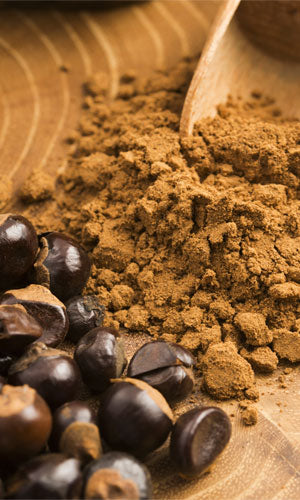
Guarana is a plant native to the Amazon basin, known for its high caffeine content. It has been used in traditional medicine for centuries, and in recent years, it has gained popularity as a natural supplement to improve exercise performance. In a recent study published in the Journal of the International Society of Sports Nutrition, researchers investigated the effects of guarana on exercise performance and metabolism in humans. The study was a randomized, double-blind, placebo-controlled trial, meaning that the participants were randomly assigned to either a guarana group or a placebo group, and neither the participants nor the researchers knew which group they were in. The study included 10 healthy young men who were recreational athletes. The participants were given either a placebo or a guarana supplement containing 400mg of guarana extract one hour before a cycling test. The cycling test consisted of four 10- minute cycling intervals, with a 5-minute rest period in between each interval. During the cycling test, the participants' oxygen consumption, heart rate, and blood lactate levels were measured. The results showed that the participants in the guarana group had significantly improved exercise performance compared to the placebo group. They were able to cycle for a longer time and at a higher intensity than the placebo group. The guarana group also had lower blood lactate levels during the cycling test, indicating that they were able to maintain a higher level of exercise intensity without experiencing fatigue. To investigate the mechanism behind guarana's effects on exercise performance, the researchers measured the participants' metabolism during the cycling test. They found that the participants in the guarana group had significantly higher rates of fat oxidation during the cycling test compared to the placebo group. Fat oxidation is the process by which the body uses stored fat as a source of energy during exercise. This suggests that guarana may help the body burn fat more efficiently during exercise. The researchers also measured the participants' levels of epinephrine and norepinephrine, two hormones that are released during exercise and play a role in the body's response to stress. They found that the participants in the guarana group had significantly higher levels of these hormones compared to the placebo group. This suggests that guarana may enhance the body's response to stress during exercise, which could contribute to its positive effects on exercise performance. Overall, the study provides strong evidence that guarana has positive effects on exercise performance and metabolism in humans. The results suggest that guarana can improve exercise performance by increasing fat oxidation, reducing fatigue, and enhancing the body's response to stress during exercise. The study's findings have important implications for athletes and fitness enthusiasts who are looking for natural ways to improve their physical performance. Guarana may be a safe and effective supplement for improving exercise performance and increasing fat oxidation. However, it's important to note that the study was conducted on a small sample size of healthy young men, and more research is needed to determine whether the findings apply to other populations, such as women or older adults. Additionally, it's important to consult with a healthcare professional before taking any new supplements, including guarana extract. In conclusion, guarana has been shown to have positive benefits for exercise performance and metabolism in humans. Its ability to increase fat oxidation, reduce fatigue, and enhance the body's response to stress during exercise make it a promising natural supplement for athletes and fitness enthusiasts. However, more research is needed to fully understand the effects of guarana on different populations and to determine the optimal dosages for improving exercise performance. Further reading:https://www.ncbi.nlm.nih.gov/pmc/articles/PMC4555111/